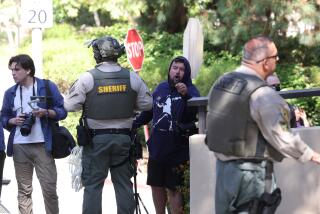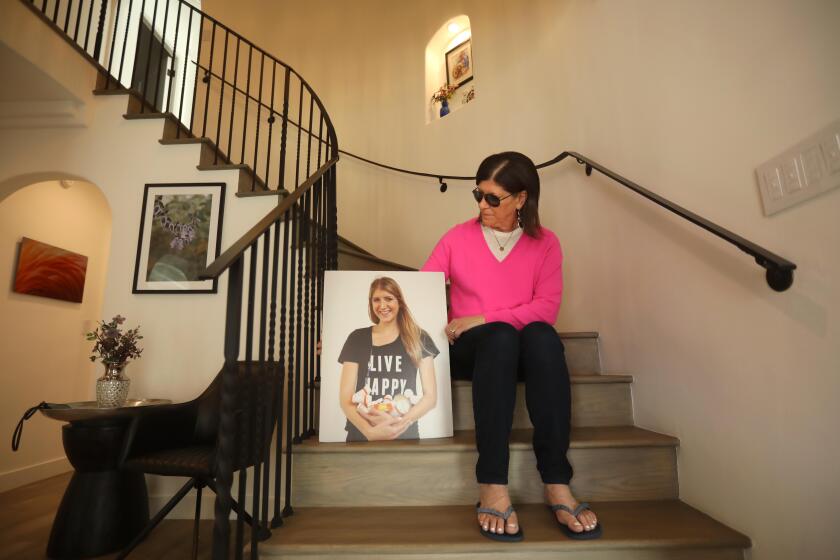U.S. Fails to Get Review of Order for New Spy Trial for Ex-FBI Agent
The federal government’s bid for a rehearing on a decision to grant a new trial for Richard W. Miller, an FBI agent whose love affair with a Soviet spy landed him in federal prison for two life terms, was denied Friday by the U.S. 9th Circuit of Appeals. The decision means that the matter will likely be appealed to the U.S. Supreme Court.
Appellate Judge Dorothy W. Nelson was joined by Judges Stephen Reinhardt and Diarmuid F. O’Scannlain in unanimously rejecting the government’s request. The same panel ruled earlier this year that Miller should be granted a new trial because jurors were allowed to hear too many details about lie detector tests that Miller failed.
In the opinion issued Friday, the judges reviewed several government arguments concerning the polygraph issue and rejected all of them.
Additionally, the judges said: “The full court (27 judges) has been advised of the (government’s) suggestion of a rehearing en banc (a panel of 11 judges), and no judge of the court has requested a vote on the suggestion for rehearing en banc. “
Next Move
This means that the next move for the government would be to file a petition with the U.S. Supreme Court to hear the case. Miller’s defense lawyers said they expect the government to seek a Supreme Court review, but there was no immediate comment from the U.S. attorney’s office in Los Angeles.
“We’re pleased with the decision,” said Joel Levine, one of Miller’s lawyers.
Miller, 52, was convicted by a Los Angeles federal jury in June, 1986, of passing FBI secrets to the Soviet KGB during an adulterous affair with Soviet emigre Svetlana Ogorodnikova. The agent, Ogorodnikova and her husband all are serving federal prison sentences. Miller is in a medium-security facility in Rochester, Minn. In mid-July, U.S. District Judge David V. Kenyon, who presided over his trial, denied him release on bail pending a new trial.
Miller’s attorney, asked about rumors that plea negotiations were under way between the former agent and the government, said that “anything’s possible,” but he expressed doubt that a bargain could be struck. The government, he said, is committed to the case “emotionally and politically.”
The prosecution has expended enormous resources prosecuting Miller. He had a three-month trial in 1985, which ended in mistrial when jurors deadlocked after three weeks of deliberations. His second trial lasted four months. He has now served nearly five years of what was originally a sentence of two life terms plus 50 years.
Significant Blow
The April overturning of his conviction was a significant blow to the government. It constituted the first reversal of a major espionage conviction in a series of more than five dozen prosecutions since World War II.
Miller, an excommunicated Mormon and father of eight, had frequent problems as an FBI agent. He asserted that his relationship with Ogorodnikova and her husband was an attempt to become a secret double agent by penetrating a KGB spy ring. But prosecutors contended that he agreed to pass a confidential U.S. intelligence assessment to Ogorodnikova in exchange for sex, $15,000 in cash, $50,000 in gold and a $675 Burberry trench coat.
Ogorodnikova and her husband pleaded guilty to espionage charges. She was sentenced to 18 years in prison after admitting that Miller gave her a confidential intelligence document. But at his trial, she reversed herself, declaring that Miller “is not a traitor to his country” and denying that she got any documents from her former paramour.
Prosecutors produced evidence at the trial that Miller, during five days of intense interrogation by his FBI superiors, failed several polygraph tests. After he was informed of the results and demanded to speak with another polygraph examiner, Miller made several damaging admissions.
Lie Detector
Prosecutors did not attempt to introduce the test results until Miller’s lawyers challenged the reliability of the admissions, contending that they were the products of a distraught, tired man who had been pressured by his interrogators. In response, government lawyers contended that it was necessary to introduce the lie detector tests to show the sequence of events in which Miller ultimately made the admissions.
Polygraph tests are rarely admissible in federal trials. The appeals court said the value of the testimony in this case, which was introduced for limited purposes, was “slight indeed,” compared to “the overwhelming potential prejudice.”
More to Read
Start your day right
Sign up for Essential California for news, features and recommendations from the L.A. Times and beyond in your inbox six days a week.
You may occasionally receive promotional content from the Los Angeles Times.






